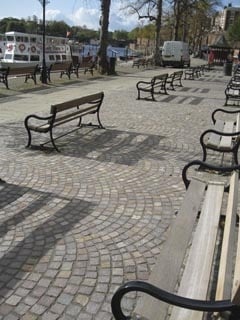For CED, 2011 has been surprisingly good for both major contracts and depot sales and a good order book now bodes equally well for 2012 . There is now a much greater understanding of the importance of creating a high quality paved or landscaped environment, whether public or private, leading to a real advance in the use of natural stone that has more than offset the downturn in construction generally.
2011 has also included many interesting and challenging projects. In The Groves, along The Riverside in Chester, porphyry setts have been laid unbound. Laying this way clearly benefits the trees and allows for easy maintenance. Even before the work was complete, emergency services needed to dig a trench through the newly laid setts. The benefit of laying unbound was clear as all the setts could be re-used and relaid seamlessly without cleaning.
Granite setts in carriageways full of buses need to be laid correctly. In Southend-on-Sea, sawn-sided 150mm cubes have been correctly detailed and laid in accordance with BS7533. The particular granite was suggested and chosen not just for its colour but also because it met the slip-resistance requirements in this very busy main road.
But the really big challenge has been in supplying the range of British paving stone that will form the geological path at the British Geological Survey’s Keyworth HQ. The British stone industry as a whole has come forward to facilitate this wonderful project, every company supplying at a much reduced price. When it opens in 2012, the path will be available to architects, designers and specifiers to visit (by appointment, as it is a secure site). For the first time, there will be a showcase of what British paving can do. There are also some interesting rocks, ranging from the oldest Lewisian gneiss to the relatively recent Ulster White limestone.
CED Ltd
728 London Road
West Thurrock
Grays, Essex
RM20 3LU
Tel: 01708 867237., sales@ced.ltd.uk

